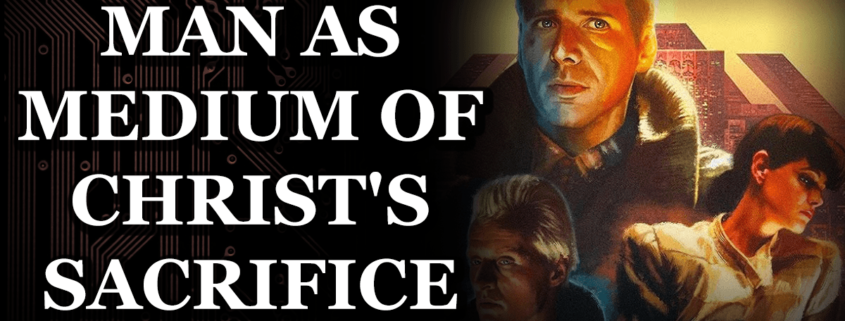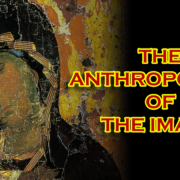Man as Medium of Christ’s Sacrifice
What does it mean to believe God created man in His image?
In Philip K. Dick’s novel Do Androids Dream of Electric Sheep? the bounty hunter Rick Deckard successfully “retires” (destroys) six rogue lifelike androids. But one slips past him—a female version called Rachael Rosen. What causes her (or it) to escape has more to do with Deckard than anything else in the story, as it is revealed later on that Rachael is programmed to seduce and dissuade bounty hunters from completing their tasks.
Deckard’s difficulty in retiring female androids becomes an issue to the extent that another bounty hunter—a much more ruthless one named Phil Resch—suggests that Deckard might want to bed them first and then kill them. It becomes clear that Deckard is unusually empathetic towards not just any android, but specifically towards attractive female ones.
While the main theme of Philip K. Dick’s novel is what makes humans distinct from artificial humanity, there also seems to be an undertone of intergender dynamics. Why would Deckard have an issue with killing female androids? Would a female bounty hunter have an identical problem? Where does this peculiar empathy towards the female of the species come from?
In our current egalitarian mindset, we rarely question our presuppositions regarding intergender dynamics. More often than not, we simply take certain privileges as a given. This was not the case throughout history. Some early Christian thinkers, for example, have suggested that Adam’s sin is a kind of imperfect precursor of Christ’s sacrifice. St. Augustine was one of them. He writes:
This falling away is spontaneous; for if the will had remained steadfast in the love of that higher and changeless good by which it was illumined to intelligence and kindled into love, it would not have turned away to find satisfaction in itself, and so become frigid and benighted; the woman would not have believed the serpent spoke the truth, nor would the man have preferred the request of his wife to the command of God, nor have supposed that it was a venial transgression to cleave to the partner of his life even in a partnership of sin.
—(City of God, chapter 14)
In his commentary on Genesis, he spells it out for us:
…Adam sinned on account of his love for Eve…
John Milton would echo this thought in Paradise Lost, where Eve responds to Adam’s choice by saying:
Tenderly wept, much won that he his Love
Had so enobl’d, as of choice to incurr
Divine displeasure for her sake, or Death.—(Book 9, lines 991-93)
The premise that Adam did not overtly sin as Eve was nothing new. Paul wrote in 1 Timothy 2:14 that “Adam was not deceived, but the woman was deceived and became a transgressor.” But the idea that Adam sacrificed himself for Eve is interesting, especially in light of the idea of chivalry upheld by modern conservatives, and deserves study.
Whether this is Biblically accurate or not, it certainly seems to be the case both culturally and societally that conventional masculinity displays a willingness to self-sacrifice for the other sex. In modern films, despite being laced with feminism, we often see male protagonists sacrificing their statuses or even their lives for their female counterparts. Some examples of male self-sacrificial archetypes in movies are Jack (Titanic), Mad Max (Fury Road), K (Blade Runner 2049), and Kylo Ren/Ben Solo (Star Wars: the Rise of Skywalker).
It would be foolish to assume that these archetypes are solely enforced by scriptwriters and not spontaneous productions of a culture that evolved this idea of male sacrifice. Our default concept of romance is itself an outgrowth of this idea called chivalry, which has polarized thinkers throughout the ages. While influencers like Rollo Tomassi argue that chivalry in its origins was never about treating women well, others like Matt Walsh, more in line with mainstream conservatism, say that it is dialectically opposed to feminism.
“A man’s love is based on idealism,” says Rollo Tomassi, “and a woman’s love is based on opportunism.” Rollo is saying this in response to this modern concept of chivalry mixed with courtly love.
“Chivalry is a starry eyed glorification of men’s suffering, and the more capricious the suffering the better,” writes Pastor Dalrock as he deconstructs chivalry and separates it from Christian sacrifice.
He continues:
In both Christianity and chivalry we are redeemed and sanctified by love. However, where Christianity teaches that Christ’s love (agape) and sacrifice/suffering is what saves and sanctifies us, chivalry teaches us that romantic love (eros), especially the romantic love of a woman, is what saves and sanctifies us. In Christianity Christ suffered undeservedly on the cross to sanctify us. In chivalry sanctification is achieved by the man suffering undeservedly at the whim of the woman.
While Dalrock’s distinction is certainly commendable and much needed, he seems to be missing the deeper point of this direction in the evolution of man’s desire. Why is the male desire to sacrificially protect the female now at a point where it has become something of a meme? Perhaps it has something to do with postmodern men looking for something authentic amidst an ocean of parodies.
There are two types of male reactions that are particularly interesting in our current gender wars milieu; both are perfectly embodied in Philip K. Dick’s bounty hunter characters. Phil Resch, who suggests that Deckard might prefer enjoying the female androids before exterminating them, is a victim of seduction; his character captures the reaction of male vengeance in our time. Deckard, on the other hand, is much more Christ-haunted in the sense that he is trapped between Resch’s suggestion and the antiquated and impractical concept of chivalry.
The reality is that Christ’s sacrifice on the cross changed intergender dynamics forever. In Revelation 21:2, John describes the new Jerusalem as a “bride adorned for her husband.” In Ephesians 5:25, Paul writes, “Husbands, love your wives, even as Christ also loved the church, and gave himself for it…” In Matthew 25:1-46, Christ says, “Then shall the kingdom of heaven be likened unto ten virgins, which took their lamps, and went forth to meet the bridegroom…”
In light of all this, what modern man struggles with is the specter of Christ’s sacrifice for His creation. Christ, though not being married in the earthly sense, redefined men’s role towards women as that of self-sacrifice. Anything that comes after Calvary must be either glorification or parodying of Christ’s sacrifice for His bride. Everything that is traditionally ascribed to marriage—prosperity, happiness, continuation of familial lineage—now takes a backseat to the self-sacrifice of Christ—the new male role model par excellence.
Deckard’s struggle is perhaps the only example of modern gender wars packaged in science fiction. Whenever he comes across a female android he is torn between eliminating her (it), as required by law or cultural norm, and reflecting God and bestowing mercy upon the one that came from his rib (Genesis 2:22). It is worth emphasizing here that the female androids are not from man’s rib; they are a Tower of Babel parody of the creation process of God. However, Deckard is still empathically drawn to these androids because of their likeness to human beings and the resulting undifferentiation.
These days, when reacting to leftist undifferentiation, conservatives tend to overemphasize hierarchy without taking time to reflect on how Christ redesigned it. As a result, conservatives end up parroting the hierarchy of dominance and necessity of old. The Psalmist in Psalm 8:3-6 says that God has crowned man with glory and honor. We get a glimpse of what this looked like in the garden of Eden prior to the fall, but in the Gospels, Jesus gives us the complete image of a true human being and a true male exercising the mystery of self-sacrificial authority. The figure of Christ eliminates coercive dominance from hierarchy and instills a sense of kenosis into intergender relations. He redeems Adam’s sacrifice for Eve and becomes the standard and role model by which we channel Him to creation, which is in the form of the woman.
The result of all this is that now the woman has the freedom to choose just as humanity has the freedom to choose either Christ or the tower of Babel. But the man cannot choose, he can either empty himself and be glorified in Christ or he can suffer as an angry disposable object in the new world of Babel.












Interesting take on the novel and contemporary gender expectations.
I wonder if you thought about how the character Iran, as Rick’s actual wife, fits into the idea of being glorified within Christ or sacrificing oneself to parodying his likeness.
In my opinion, Iran is the force the keeps Deckard coming back to empathy and faith in God (Mercer). Her character actually nourishes Rick, he acts towards her in ways that aren’t self sacrificial, but mutually nourishing.
In some ways they only have each other and Mercer (God) like Adam and Eve. Thoughts on the tension Iran offers to the idea that the novel presents a gender war question?
Interesting observation. After the death of their sheep, Iran seems to transform into a likeness of the nurturing God for Deckard. Perhaps her relationship with Deckard can be expanded in a future article.